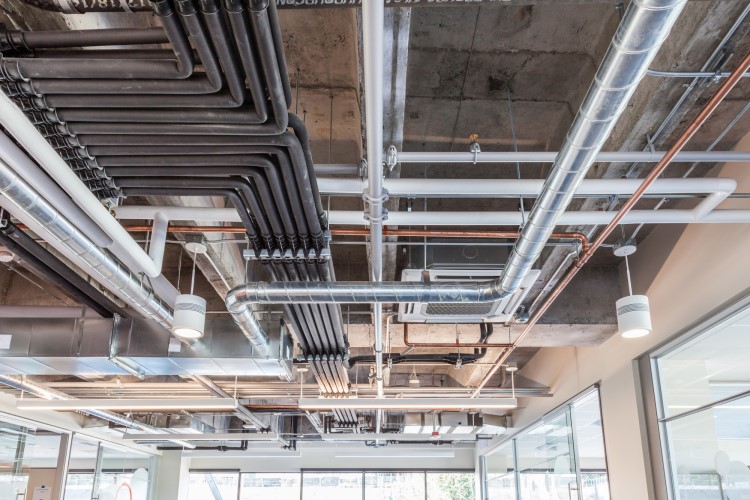How Long Do Commercial HVAC Systems Last?
Industries need reliable commercial HVAC solutions to optimize employee and customer experiences. Moreover, business heating and cooling systems improve indoor air quality, reducing allergen levels and respiratory health risks.
However, commercial heating and air conditioning cost twice as much as residential HVAC units. Even more, when you consider energy bills, property size, capacity, and frequency of use. You also have additional costs, like tune-ups, emergency repairs, and replacements.
Addressing critical AC and heater concerns early increases your equipment’s lifespan, which reduces cost. Yet, how long do commercial HVAC systems last?
Discover the answer, and learn the latest maintenance tips for getting the most out of your HVAC.
How Long Do Commercial HVAC Systems Last on Average?
On average, industry-standard heating and cooling equipment should last up to 15 years. However, several variables impact HVAC longevity.
Factors include:
- HVAC system type
- Installation processes
- Equipment quality
- Routine maintenance
- Heat and cool load calculations
- Proper ventilation and ductwork
- Size and condition of the property
- Your HVAC SEER ratings
Understanding this information increases your HVAC’s lifespan from the beginning, starting with proper load calculations, units, and more.
Load Calculations and Commercial HVAC Lifespan
Before installing an HVAC system, an experienced contractor performs heat and cool load calculations first.
Heating and cooling are measured in BTUs, short for British Thermal Units. The final heat load calculation represents the total amount of BTUs required to heat the entire space. The cool load number is the amount of thermal energy you need to remove to maintain cool indoor temperatures during summer.
If your contractor doesn’t calculate the property’s heat and cool load, you may end up with HVAC units that are too large (or small) for your commercial property. This mistake overworks your equipment, shortening your system’s lifespan.
Forgetting to calculate heat and cool load is common with DIY installations and inexperienced HVAC contractors. Industrial Mechanical’s skilled HVAC technicians have completed meticulous 5-year training programs and boast several years of real industry experience.
HVAC Installation Tips to Improve Your HVAC’s Lifespan
More variables can go wrong with an incorrect HVAC installation. Plus, commercial HVAC systems are more involved than residential heating and cooling.
Complex HVAC components include:
- Large rooftop backup HVAC units
- HVAC control rooms
- Custom water heater systems
- Environmental control equipment
- Process piping systems
- Commercial air handlers
- Gas-fired units
You also need the right type of commercial HVAC system for your business.
For example, while a central air system may work for a large facility, a small retail store could save more money with a split system. You may need new heat pumps, radiant heaters, and cooling coils too. Fortunately, Industrial Mechanical specialists are standing by to suggest the right system and equipment from top brands like Carrier, Lennox, Trane, and Mitsubishi.
Avoid HVAC Leaks
Inexperienced installations also lead to problematic AC leaks. Not only do refrigerant leaks shorten your HVAC system’s lifespan, but you also expose your employees and customers to the dangers of commercial AC leaks.
Common hazards include:
- Mold-related respiratory problems from humidity
- Slips and falls from water leakage
- Distracting hissing sounds
- Plummeting indoor air quality
- Slippery oily residue
- Prolonged heating and cooling cycles
- Contamination
- Skyrocketing utility bills
- Frosted evaporator coil equipment
The above issues chip away at your HVAC equipment’s lifespan.
Plus, as a business owner, you must maintain a safe HVAC system (and surrounding area) to avoid costly OSHA fines. Industrial Mechanical even has an ironclad safety policy that ensures strict compliance with local, state, and federal guidelines, including requirements highlighted by the EPA and OSHA.
How Your SEER Rating Impacts Lifespan
Your air conditioner’s seasonal energy efficiency ratio also affects your system’s lifespan.
Commonly known as the SEER rating, this industry-standard score represents the amount of energy and money required to power an AC unit for at least one year. This ratio is the average cool air output for an AC during a typical season divided by the amount of BTUs required.
The most efficient commercial air conditioners have SEER ratings within the mid-20s range. However, any commercial SEER rating of 18 and over is considered highly efficient.
You’ll notice older commercial HVAC systems have SEER scores below 18, with 14 being the lowest. Unfortunately, low SEER ratings come with a high cost. Industrial Mechanical can replace your current system with new high SEER-rated units for maximum efficiency.
Since commercial air conditioners with high SEER ratings are more energy-efficient, they last longer than old models. Your AC works less to generate and distribute air evenly. Plus, business owners can install smart thermostat technology to program heating and cooling schedules, putting less strain on HVAC systems.
Increase Your HVAC’s Lifespan With Routine Maintenance
Simply checking your commercial HVAC system for issues can save you a lot of trouble. Yet, busy businesses struggle with finding the time for simple inspections. Instead, invest in a consistent HVAC maintenance solution.
For example, certified IMC maintenance agreements ensure commercial HVAC equipment is properly maintained and upgraded to maximize savings, energy, safety, and OSHA compliance. Routine services include filter changes, equipment lubrication, coil maintenance, and electrical troubleshooting.
Implementing a robust energy efficient management plan from the beginning also ensures the longevity of your commercial heating and cooling equipment.
This plan requires custom energy design, system programming, and complex installation. Reliable monitoring ensures your HVAC’s efficiency and functionality while preventing costly downtime, heating and cooling loss, and repairs. 24-hour emergency HVAC services work quickly to safeguard your system.
Regular audits also help businesses save money by revealing strengths and weaknesses in energy consumption, HVAC performance, and water systems.
Install a Commercial HVAC System You Can Trust
So, how long do commercial HVAC systems last?
With the right care, heat and cool load calculations, SEER ratings, and energy maintenance plan, your company’s HVAC system will long outlast your competition’s.
Let Industrial Mechanical Contractor’s Inc. develop the ideal commercial HVAC solution for your business, including installation, routine maintenance, HVAC system replacements, and energy management.
Call today or request a quote to get started on your project right away.






